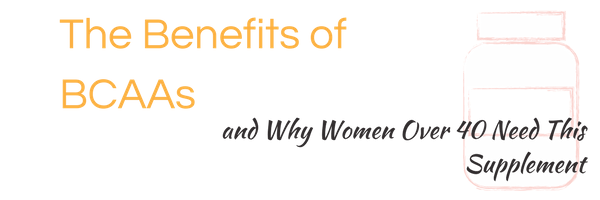
Exercising is important at all stages of life and doubly so when you’re experiencing perimenopause (approx five to ten years before menopause). Exercise can help mitigate many of the common symptoms of menopause from weight gain to mood.
Whether you’re looking to prevent soreness and fatigue, or supplement your protein intake, branched chain amino acids (BCAAs) are crucial. (1)
What are BCAAs?
What are BCAAs, though?
BCAA stands for branched chain amino acids.
Think of these as the building blocks of protein.
Nine of the 28 amino acids are considered essential amino acids. These essential amino acids cannot be produced by the body so you must get your intake through food or by taking supplements. (2)
The 3 BCAAs are:
- Leucine
- Isoleucine
- Valine
Think of amino acids as small components of protein. Once you eat a source of protein, your body breaks it down into amino acids which are then absorbed into the bloodstream.
We’ll look now at some of the advantages of taking enough BCAAs on board.

The Benefits of Getting Adequate Amounts of BCAAs
BCAAs are vital for your overall health but how about the importance of BCAAs for women during menopause? We’ll briefly explore 3 key benefits you could derive from making sure you get enough branch chain amino acids through food or dietary supplements.
- Supplying Nutrients To Your Muscles: If you’ve incorporated some cardio routines into your exercise program during menopause, your muscles will be broken down with tiny tears that need repairing. BCAAs, leucine, in particular, can help directly with muscle development. By helping to repair this muscle tissue. BCAAs for women can make you stronger than ever before and better equipped to keep on exercising throughout the menopause. (3)
- Reducing Soreness After Exercising: If feeling sore and tired after exercising puts you off, don’t be disheartened. Certainly, don’t give up! BCAAs can be a serious weapon if you’re looking to reduce muscle soreness. Make sure you take enough BCAAs and you won’t eliminate that feeling of muscle fatigue completely but it will not be so bothersome. (4)
- Help Brain Function and Repair: Branched-chain amino acids can work wonders for overall brain function. There’s even some suggestion that BCAAs can help repair the cognitive damage. If you want to feel sharper and at least partially mitigate symptoms of menopausal brain fog, pay attention to those BCAAs in your diet. (5)
Forms in Which You Can Take It
So…
Now you know what branched chain amino acids are and what they can do, how do you make sure you get enough?
Natural Protein Sources in Food: The first and most obvious way to get plenty of BCAAs into your system is to eat protein-rich foods such as yoghurt, milk, meat, fish, eggs and nuts. (6) Present in all foods containing protein, you won’t even need to go out of your way to plan. You should make sure you consume plenty of protein during menopause anyway (7) so things should fall naturally into place with BCAAs.

Forms in Which You Can Take It
Now that you know what branched chain amino acids are and what they can do, how do you make sure you get enough?
- Natural Protein Sources in Food: The first and most obvious way to get plenty of BCAAs into your system is to eat protein-rich foods such as yoghurt, milk, meat, fish, eggs and nuts. Present in all foods containing protein, you won’t even need to go out of your way to plan. You should make sure you consume plenty of protein during menopause anyway so things should fall naturally into place with BCAAs. (6) (7)
- BCAA Supplements: If you don’t manage to get enough protein as part of your normal diet, first – you should really try to increase your consumption. If this fails, there are plenty of BCAA supplements to help you hit this goal. These supplements are not inexpensive. If you decide supplementation is right for you, do your research and consider whether or not eating more protein in natural foods wouldn’t make better sense while costing less. (8)
How BCAAs Can Aid In Weight Loss
There is another possible upside to taking BCAA supplements…in some instances, they can work as a weight loss tool.
How is this possible?
While evidence suggests that branched-chain amino acids do not lead directly to a loss of fat mass, there are some important ways in which they can give you a helping hand. (9)
- You’ll Exercise More: If you’d like to exercise more than you do but you find yourself too fatigued, BCAAs for women can give you a valuable extra edge and make you feel less tired. In turn, you’ll be able to burn more calories from your cardio sessions by exercising more and for longer. (10)
- You’ll Get Fewer Food Cravings: If you regularly find yourself craving sweet foods or carbs, giving in to that temptation can result in weight gain. BCCAs can help your brain to produce serotonin. This neurotransmitter, when levels are too low, tells your brain you’re hungry. With BCAA supplements, there’s a chance you’ll experience fewer cravings which can only help your waistline.
BCAAs are not primarily used for weight loss and studies suggest this is not an area where they are effective. We’ve presented two realistic benefits rather than creating false hopes that BCAAs are a weight loss miracle.
BCAAs for women are vital at all times, especially during menopause. Perhaps this is worthy of a conversation with your doctor about the appropriateness for your own health outcomes.
Resources
1) http://www.idealfit.com/blog/the-abcs- of-bcaas- and-why- women-need-them/
2) https://www.bodybuilding.com/fun/over-40- fitness-supplements- muscle-revolution3.htm
3) https://academic.oup.com/jn/article/136/2/533S/4664398
4) https://www.ncbi.nlm.nih.gov/pubmed/20601741
5) https://www.prnewswire.com/news-releases/with- amino-acid- diet-mice-improve-after- brain-injury- 78772612.html
6) http://healthyeating.sfgate.com/foods-high- bcaas-10382.html
7) https://www.ncbi.nlm.nih.gov/pubmed/24522467
8) https://www.bodybuilding.com/fun/bcaas-the- many-benefits- of-amino-acids.html
9) https://www.ncbi.nlm.nih.gov/pmc/articles/PMC4865017/
10) https://www.ncbi.nlm.nih.gov/pmc/articles/PMC3630467/



